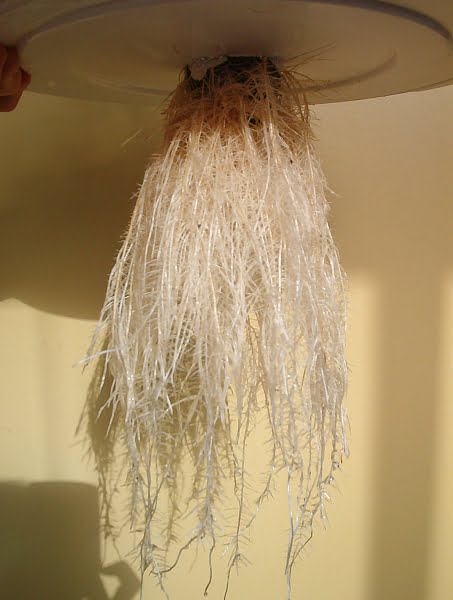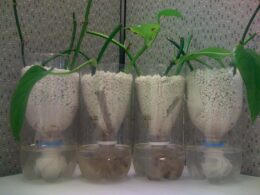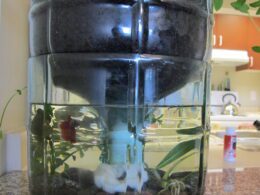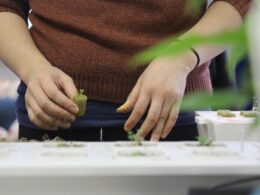Are you tired of struggling to keep your houseplants alive? Do you want a low-maintenance solution that yields healthy, thriving plants? Look no further than hydroponics.
Hydroponics is a method of growing plants without soil, using only water, nutrients, and a growing medium. But is it really better than traditional soil-based methods?
The answer is a resounding yes. Hydroponics has numerous benefits over soil-based methods, including faster growth, higher yields, and reduced risk of pests and diseases. Plus, it’s more environmentally friendly, using less water and producing less waste.
So if you’re ready to take your houseplant game to the next level, read on to learn more about the advantages of hydroponics and how to choose the best method for your needs.
Understanding Hydroponics
You might be surprised to learn that there’s a whole new way of growing plants that doesn’t require any soil at all, and it just might revolutionize the way you care for your green friends. This is called hydroponics, and it’s a method of indoor gardening that uses a nutrient solution instead of soil.
This type of gardening has been gaining popularity in recent years, and for good reason. With hydroponics, you can control exactly what nutrients your plants are receiving, which can lead to healthier and stronger plants. Additionally, because there’s no soil involved, there’s no need to worry about pests or diseases that can be found in traditional soil-based gardening.
And since everything is happening in a controlled environment, you can grow plants year-round, regardless of the weather outside. If you’re interested in trying hydroponics for yourself, there are plenty of resources available online to help you get started. You can purchase pre-made hydroponic systems or even build your own using materials from your local hardware store.
Just remember, while hydroponics may seem intimidating at first, it’s actually a simple and rewarding way to care for your houseplants. So why not give it a try? Your plants will thank you.
Benefits of Hydroponics
If you’re looking for houseplants that grow quickly and produce more yield, hydroponics is the way to go.
With hydroponics, you’ll also save on water and space since the plants don’t need as much of either.
Plus, you’ll have fewer problems with pests and diseases, making it easier to maintain a healthy and thriving indoor garden.
Faster Growth and Higher Yields
Growing your houseplants in a hydroponic system can lead to faster growth and higher yields. By providing a nutrient-rich water solution, you can give your plants exactly what they need to thrive.
In soil, nutrients are not always readily available and can become depleted over time, leaving your plants struggling to grow. In a hydroponic system, nutrients are constantly available, allowing your plants to absorb them quickly and efficiently.
Not only does hydroponics lead to faster growth, but it also produces larger harvests. With traditional soil gardening, there are limitations to the size and health of your plants. However, in a hydroponic system, you have greater control over the environment, allowing your plants to reach their full potential.
By providing the perfect balance of light, water, and nutrients, you can expect bigger, healthier plants and a more abundant harvest. Plus, hydroponics also has a smaller environmental impact than traditional soil gardening, making it a smart choice for those who want to reduce their carbon footprint.
Less Water and Space Required
You’ll be amazed at how little water and space your plants will need in this system, allowing you to grow a lush garden even in the tiniest of apartments. Hydroponics is a water conservation method that uses up to 90% less water than traditional soil gardening. This is because the water is recirculated through the system, and the plants only take up what they need.
With hydroponics, you won’t have to worry about overwatering or underwatering your plants, as the system is designed to provide the perfect amount of water and nutrients to your plants. Urban gardening is becoming more popular, and hydroponics is the perfect solution for those who want to grow their own food in limited space.
With hydroponics, you can grow a variety of plants in a small area, and you won’t have to worry about soil-borne diseases or pests. The system is also easy to maintain, and you can grow plants year-round, regardless of the weather outside. So, if you’re looking for a way to grow a beautiful garden in a small space while conserving water, hydroponics is the way to go.
Fewer Pests and Diseases
With fewer pests and diseases to worry about, maintaining a thriving garden has never been easier! Hydroponics eliminates the need for soil, which is often a breeding ground for pests and diseases.
This means that you can grow your houseplants without worrying about harmful insects and fungi ruining your beautiful plants. To further prevent infestations, hydroponics also allows for the use of natural remedies.
For example, you can use ladybugs to control aphids or neem oil to repel spider mites. Additionally, hydroponic systems are often enclosed, which means that pests and diseases are less likely to enter your garden in the first place.
With hydroponics, you can enjoy a healthier and more pest-free garden without the need for harmful pesticides or constant vigilance.
Advantages of Soil-based Methods
If you’re looking for a more traditional approach to indoor gardening, soil-based methods offer a classic and natural way to nurture your plants. Soil is rich in nutrients that plants need to thrive, and the composition of these nutrients can vary depending on the type of soil you choose.
Additionally, soil-based methods have a lower environmental impact compared to hydroponic systems, which require more energy to operate.
One advantage of soil-based methods is that they can be easier to maintain for beginners. Soil acts as a natural buffer, helping to regulate moisture levels and prevent overwatering. This can be especially helpful if you’re new to gardening and may not be as familiar with the optimal watering schedules for different types of plants. Additionally, with soil-based methods, you don’t have to worry about pH levels or nutrient ratios, as the soil already contains these essential elements.
Another advantage of soil-based methods is that they can be more forgiving when it comes to mistakes. Overfertilizing or using the wrong type of nutrient solution in hydroponic systems can quickly lead to plant damage or death. With soil-based methods, you have a bit more leeway to make mistakes and learn as you go.
Plus, if you’re someone who enjoys the tactile experience of gardening, soil-based methods offer the satisfaction of getting your hands dirty and feeling connected to the natural world.
Disadvantages of Hydroponics
The downside of using hydroponic systems is that they require more energy to operate, which can have a higher environmental impact. Unlike soil-based methods, hydroponic systems rely on electricity to power pumps and other equipment that keep the plants growing. This means that if you’re concerned about your carbon footprint, hydroponics may not be the best choice for you.
Another issue with hydroponic systems is cost effectiveness. While they can produce high yields in a small space, they can also be expensive to set up and maintain. You’ll need to purchase specialized equipment, nutrients, and other materials to keep your plants growing. Plus, if something goes wrong with your system, it can be difficult and expensive to troubleshoot and repair.
Overall, while hydroponics can be a fun and innovative way to grow plants, they may not be the best choice for everyone. If you’re looking for a more cost-effective and environmentally friendly option, soil-based methods may be a better fit for your needs. However, if you’re willing to invest the time and money to set up and maintain a hydroponic system, it can be a rewarding experience that produces high-quality plants.
Choosing the Best Method for Your Needs
Deciding which method is right for you can be challenging, but don’t worry, we’ll help you determine the best fit for your needs. When it comes to houseplants, you have two main options: hydroponics or soil. Indoor plants are typically grown in soil, while hydroponics is more commonly used for outdoor crops. However, this doesn’t mean you can’t use hydroponics for your indoor plants.
One factor to consider when choosing between hydroponics and soil is the cost. Hydroponic systems can be more expensive to set up initially, but they require less maintenance and can lead to higher yields over time. Soil, on the other hand, is cheaper to start with, but it can be more difficult to maintain and may require more frequent watering and fertilizing.
Another factor to consider is your personal preference and lifestyle. If you enjoy the traditional method of gardening and don’t mind getting your hands dirty, soil may be the better option for you. If you prefer a more hands-off approach and want to save time and effort, hydroponics may be the way to go.
Ultimately, it comes down to what works best for you and your plants. Take some time to research and experiment with both methods to see which one fits your needs and preferences.
Frequently Asked Questions
Can hydroponic systems be used for all types of houseplants?
If you’re interested in indoor gardening and keeping your houseplants healthy, hydroponic systems may be a good option for you. These systems can be used for many types of houseplants and offer benefits such as easy nutrient management and faster growth.
With hydroponic systems, you can control the environment in which your plants grow and avoid issues such as soil-borne diseases. Overall, hydroponics can be a safe and effective way to care for your houseplants and promote their health.
Is the setup and maintenance of a hydroponic system more expensive than traditional soil-based methods?
When it comes to the setup and maintenance of a hydroponic system for your houseplants, you may be wondering if it’s worth the cost.
A cost comparison between hydroponics and traditional soil-based methods shows that hydroponics can be more expensive to set up initially, but can save money in the long run due to lower water usage and higher yields.
However, it’s important to consider the environmental impact of hydroponics, as it requires electricity to power pumps and lighting.
Overall, the decision between hydroponics and soil-based methods depends on your individual preferences and priorities.
Does hydroponic cultivation require more or less water than soil-based methods?
When it comes to water efficiency and environmental impact, hydroponic cultivation can be a great option. This method of growing plants uses significantly less water than traditional soil-based methods, making it a more sustainable choice.
Additionally, because hydroponic systems are typically set up indoors, they can reduce the amount of water needed for irrigation and minimize the amount of runoff that can contribute to pollution.
Overall, if you’re looking for a way to grow plants with minimal water usage and a reduced environmental impact, hydroponic cultivation may be the way to go.
Are hydroponically grown plants more susceptible to pests and diseases?
When it comes to hydroponic cultivation, there are some concerns about pest resistance and nutrient absorption. However, hydroponically grown plants can be more susceptible to pests and diseases. To combat this issue, you can use pest-resistant plant varieties and implement proper sanitation practices.
In addition, because hydroponic systems provide a controlled environment, nutrient absorption can actually be more efficient than in soil-based methods. With proper care and attention, hydroponic cultivation can be a successful and rewarding way to grow healthy and resilient plants.
Do hydroponically grown plants have the same level of nutrients as those grown in soil?
When it comes to nutrient comparison and growth rate, hydroponically grown plants can actually have an advantage over those grown in soil. Since hydroponic systems provide direct access to water and nutrients, plants can receive a more precise and consistent level of nutrition. This can result in faster growth and healthier plants overall.
However, it’s important to note that the specific nutrients provided in hydroponic systems can vary depending on the setup, and it’s still crucial to monitor and adjust nutrient levels as needed. While hydroponics may not necessarily be better than soil for houseplants, it can be a viable option for those looking to optimize their plant’s growth and nutrition.
Conclusion
So, is hydroponics better than soil for houseplants? Well, it depends on your specific needs and preferences.
Hydroponics offers several benefits like faster growth, increased yield, and reduced water usage. However, it also has some disadvantages, such as the need for specialized equipment and a more complex setup.
On the other hand, soil-based methods may be more straightforward and cost-effective, but they may not provide the same level of control and precision as hydroponics.
Ultimately, the best method for your houseplants will depend on factors like your budget, available space, and personal preferences. It’s essential to weigh the pros and cons of each option before making a decision.









